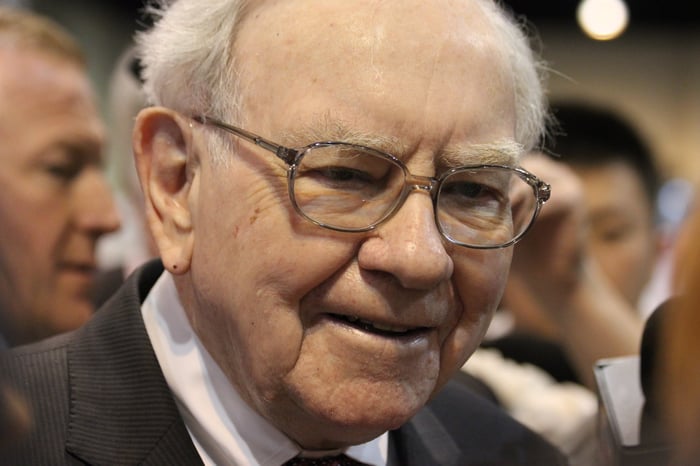For more than 57 years, Berkshire Hathaway (BRK.A -0.28%) (BRK.B -0.68%) CEO Warren Buffett has put on a moneymaking clinic for Wall Street. Through the end of 2021, the Oracle of Omaha oversaw an average annual return of 20.1% for the company's Class A shares (BRK.A), which was nearly double the average annual total return, including dividends paid, for the S&P 500 over the same stretch.
While there's a long list of reasons to account for Warren Buffett's success over nearly six decades, his affinity for buying value stocks sits near the top of the list. Instead of chasing unproven companies, Buffett has a habit of packing Berkshire Hathaway's portfolio with highly profitable, time-tested stocks that can be purchased for a reasonably low valuation.

Berkshire Hathaway CEO Warren Buffett. Image source: The Motley Fool.
Listed in ascending order are the 10 cheapest stocks Warren Buffett currently owns, based on each company's forward-year price-to-earnings (P/E) ratio:
- Ally Financial (ALLY 0.13%): Forward P/E ratio of 4.79
- General Motors (GM -0.04%): 6.38
- HP (HPQ 1.55%): 6.39
- Celanese (CE -0.40%): 6.92
- Citigroup (C -0.32%): 7.03
- Occidental Petroleum (OXY -0.09%): 7.88
- Bank of America (BAC -0.13%): 8.93
- DaVita (DVA -0.87%): 8.97
- U.S. Bancorp (USB 1.56%): 8.98
- Chevron (CVX 0.44%): 9.21
Keep in mind that the S&P 500's forward P/E ratio is closer to 17, as of September 7, 2022. While certain industries do, traditionally, trade at lower multiples to their forecast earnings, these 10 Buffett stocks are quite inexpensive if they can meet or beat Wall Street's expectations.
Here are a few things to note when analyzing Warren Buffett's cheapest stocks.
Cyclical businesses ebb-and-flow with the economy
To begin with, the Oracle of Omaha loves cyclical companies. By "cyclical," I mean businesses that ebb-and-flow with the economy. If the economy is firing on all cylinders, we'd expect cyclical businesses to perform well. Conversely, when economic contractions or recessions arise, cyclical stocks often struggle. With U.S. gross domestic product declining in back-to-back quarters, we currently look to be in the "ebb" portion of the economic cycle.
For instance, automaker General Motors and personal-computing company HP are probably valued as inexpensively as they are due to the growing likelihood of the U.S. or global economy entering a recession. Consumers and businesses are less likely to open their wallets and purchase new vehicles or computers during periods of heightened uncertainty.
However, it's equally important that investors realize the U.S. and global economy spend a disproportionate amount of time expanding, relative to contracting. Even though recessions and economic downturns are inevitable, cyclical business with an inexpensive valuation and a clear path to growth can take advantage of these long-winded periods of expansion. This means General Motors' push to electric vehicles, and the steady operating cash flow generated from HP's PC and printer sales, can still be long-term needle-movers for investors.

Image source: Getty Images.
Patient investors can find serious bargains among financial stocks
Something else that likely stands out is that four of the cheapest Warren Buffett stocks are financials: Ally Financial, Citigroup, Bank of America, and U.S. Bancorp.
To echo the previous point, financial stocks are cyclical. When the U.S. economy is thriving, banks are busy growing their loan portfolios and generating added income from deposits. But when recessions arrive, bank stocks typically see an increase in loan delinquencies and charge-offs. This requires most banks to set aside capital for loan losses, which reduces their near-term profits.
But long-term investors like Warren Buffett have seen these cycles before and fully understand that banks benefit from the natural expansion of the U.S. economy over time.
For example, Bank of America is the most interest-sensitive of the big banks and should see its earnings per share expand as interest rates rapidly climb. Even if its loan delinquencies rise in the short run, BofA's vast portfolio of rate-sensitive loans should propel profits higher.
Likewise, U.S. Bancorp has done a better job than arguably any bank at getting its active users to bank digitally. With 82% of users regularly banking online or via mobile app, the company is able to significantly reduce its noninterest expenses and deliver one of the highest return on assets among large banks. These are the types of solid financial stocks that won't remain "cheap" for long.
Energy stocks could be an amazing value
Lastly, the only two energy stocks that Berkshire Hathaway owns -- Chevron and Occidental Petroleum -- are among the cheapest Warren Buffett stocks.
A unique set of circumstances have sent energy commodity prices soaring in 2022. Russia's invasion of Ukraine, along with reduced investment in drilling and infrastructure by oil majors during the pandemic, has created a scenario where crude oil and natural gas supply shortages are boosting spot prices. As a result, oil and natural gas hit multidecade highs this year and have sent the profit outlooks for Chevron and Occidental Petroleum markedly higher.
The big question mark is whether these historically high commodity prices will extend for years or falter. While a recession would, undoubtedly, weigh on crude oil and natural gas prices in the very short-term, Russia's invasion of Ukraine and the chronic underinvestment of domestic drilling and infrastructure aren't issues that'll be easily remedied. In other words, a strong case can be made that oil stock earnings will remain elevated for years to come.
Considering that oil stocks are known for their robust capital return programs, these energy stocks could be a big-time bargain.





